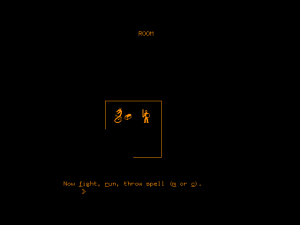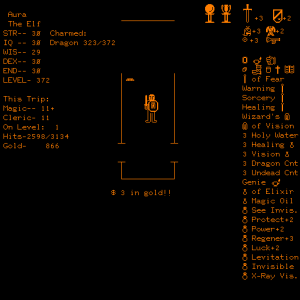The CRPG form lacks an Adventure — an urtext universally known and acknowledged as its starting point. I can propose a couple of reasons why this is so.
CRPG fans have, some exceptions aside, generally not shown anything like the same dedication to documentation and historical preservation that marks the modern interactive-fiction community, which has perhaps prevented an accepted canon of historically significant works from appearing amongst the former as it has amongst the latter. Likewise, for all its enduring commercial popularity the CRPG has not acquired the same academic cachet as has IF; it’s easier to justify study of a “literary” form like IF within the academy than it is a form that revolves around killing hordes of monsters and leveling up, no matter how much fun that process might be. Just as significantly, Adventure had the good fortune to become really, really popular. It was the Doom of late 1970s institutional computing, a game that absolutely everyone who spent any time within that culture had to know and probably tried to play at least once or twice. The early proto-CRPGs of the same era, of which there were a fair number, did not spread so widely and did not come to occupy the same storied place in hacker lore. Most were created on a pioneering system called PLATO (Programmed Logic for Automated Teaching Operations — how long did they work to make that acronym fit?), which linked hundreds of educational institutions around the U.S. together via thousands of dumb terminals, a handful of mainframe computers, and a central hub at the University of Illinois.
I could easily devote a whole series of posts to PLATO, the first sustained online community to connect everyday people — mostly students from elementary to university age — together. I’ll just give you the short version here, though, and mention that PLATO was remarkable indeed in many ways, laboratory of countless innovations, from the vision of computer-assisted instruction that spawned it in the first place to the uniquely user-friendly custom operating system it ran to its TUTOR programming language that let anyone design new “lessons.” Uniquely amongst institutional systems, its terminals offered graphics and, if your school had chosen to spring for some additional gadgetry, possibly even some sound and music capabilities. Originating all the way back in 1960, PLATO reached a certain level of maturity with the roll-out of the PLATO IV system in 1972, and grew rapidly in this incarnation throughout the 1970s. Its graphical capabilities made PLATO exceptionally suited for gaming in comparison to other institutional systems, which still generally relied on clunky text-only teletypes for input and output. Throw in the fact that most of these terminals were being used by students with a bit of time on their hands, and that they had the easy-to-learn TUTOR language at their disposal, and it’s not surprising that PLATO became something of a hotbed of game development immediately before the beginning of the PC era and even for some years thereafter. Amongst these games were the first attempts to bring the Dungeons and Dragons experience to the computer. They began to appear as early as 1975 — even before Will Crowther’s creation of Adventure.
The earliest of these games were created without proper authorization from PLATO’s administrators. Thus they had to hide out on the system under unassuming, workmanlike names such as pedit5 and m199h, with word of their existence being passed around in secret. Inevitably, as their popularity increased they attracted the notice of administrators and were promptly deleted. Luckily, what appears to be the original version of Rusty Rutherford’s pedit5 has been restored and made available by the folks at cyber1, a resurrected PLATO system accessible via the Internet.
As the first or second game of its type to appear, pedit5 has a decent claim to stand as the CRPG’s equivalent of Adventure. Certainly it’s of immense historical importance.
That said, the most long-lived and popular of these games, the one that first defined the experience of the CRPG for many in the same way that Adventure did that of the text adventure, came a bit later. Its name left no doubt as to its inspiration: dnd. A much more sustained and ambitious project than the one-off pedit5, dnd was initially written by Gary Wisenhunt and Ray Wood, then expanded and refined by Dirk Pellett. By October of 1976 it had reached a basically finished state, becoming a surprisingly complex experience and a very popular one amongst PLATO users; the counter of total plays was already almost 100,000 at that time.
Dnd spawned a whole family of PLATO dungeon crawls which share their ancestor’s blissful unconcern with copyright. Nowadays the lawyers of the Tolkien estate would be all over Moria and Orthanc.
It might make an interesting little exercise in platform studies to ask why the PLATO system hosted so many dungeon crawls, while text adventures became the diversion of choice amongst the hardcore hackers working on their DEC systems. A good part of the answer comes down to technological constraints: PLATO could do screen-oriented, graphical displays rather beautifully really, while the PDP line continued to rely on line-oriented output devices capable only of text. The broader implications of this for interactive-fiction fans, that gamers have always preferred their pretty pictures and will take them whenever they can get them over plain text, are perhaps too disquieting to dwell on. If it helps, though, it’s also true that the two computing cultures used incompatible hardware and communicated over wholly separate networks, thus keeping these two burgeoning gaming traditions wholly separate from one another before they began to mix in the great melting pot of the PC world. Adventure and dnd after all gave each of these communities, still very small by modern computing standards, plenty of inspiration and plenty to iterate on without leaping into whole other paradigms of play.
Similarly, the most popular platforms of the early PC era, the TRS-80 and the Apple II, initially hosted quite different strains of adventure. Thanks largely to the efforts of Scott Adams, the TRS-80 went in the PDP hackers’ direction to host the first text adventures to enter the home. The Apple II, meanwhile, the only member of the class of 1977 with graphics capabilities even close to those of PLATO, went in the direction of dnd. Given the sketchy documentation and the ad hoc nature of most software “publication” of that era, it’s extremely difficult to say with certainty what game marked the first CRPG to appear on the Apple II — and by extension the first to appear on a home PC. Synergistic Software’s Dungeon Campaign, which appeared right about the time that Adams was shipping off those first tapes of Adventureland, is probably the best candidate.
For our purposes, though, I want to stick with our faithful old TRS-80 for just a little bit more. Next time I’ll be taking a close look at the first commercial RPG to be developed and sold for that platform, The Temple of Apshai (1979). As an heir both to Dungeons and Dragons and the early CRPG tradition that began with pedit5 and dnd, Apshai will give us a chance to see how a CRPG of this very early era actually played.












Frédéric Grosshans
August 2, 2017 at 8:51 am
A typo: The counter of total plays bwas …
Jimmy Maher
August 2, 2017 at 12:47 pm
Thanks!
Ben
March 5, 2020 at 8:26 pm
caché -> cachet
almost to 100,000 -> almost 100,000
Jimmy Maher
March 6, 2020 at 6:19 am
Thanks!
Jeff Nyman
October 16, 2021 at 11:19 am
“The broader implications of this for interactive-fiction fans, that gamers have always preferred their pretty pictures and will take them whenever they can get them over plain text, are perhaps too disquieting to dwell on.”
Perhaps … but why, though? Text adventures were probably always doomed to a very short life, at least in the broader spectrum of gaming. They stood in until something that people responded to better came along.
What’s perhaps interesting to consider, historically, is the following: let’s say the PDP line had capabilities similar to PLATO. In that case, would any of the text-based adventure format have really persisted at all? Would they have even gotten started? We know “Adventure” from Will Crowther was not influenced by games like “Hunt the Wumpus” (and its predecessors like the “Caves” game from the People’s Computer Company days). Thus it was mainly influenced by D&D, just as were the PLATO games.
So now let’s say Crowther had access to a system on the PDP like PLATO with its graphic capabilities. Would Crowther have chosen to craft a game that way? Obviously we don’t know but I think it’s arguable that it’s very, very likely.
What this means is that the idea of the text adventure got lucky in that it managed to spread a bit before it could be snuffed out. Historically, I think, that’s interesting.
Likewise, let’s say it was NOT the case that “the two computing cultures used incompatible hardware and communicated over wholly separate networks.” In that case, even if the text-adventure did get a brief start to life, would it have been quickly subsumed once players saw the possibilities of what the CRPGs offered? Again, historically, interesting.
I truly believe the text adventure was an unlikely development; at least one that would persist. Instead it was sort of this road people took since they saw no other path. And by the time those other paths became available, it was entrenched enough to have commercial possibilities, albeit extremely brief.
Busca
October 1, 2024 at 6:18 pm
For anyone interested in an update on research into the earliest CRPGs, the CRPGAddict (blog already linked at the top of this entry) wrote an article in 2021 which he’s been updating since as new findings have been made, most notably in summer/autumn of 2023.
An important part of that is also thanks to the relentless digging of El Explorador de RPG whose recounting of his respective ‘detective story’ I also recommend, as well as his site in general for details on early CRPGs, of which he has already dug up a respectable number of obscure and so far apparently undocumented ones. (It’s in Spanish, but that should not present a major obstacle in this day and age of ever more advanced and readily available online translation options.)